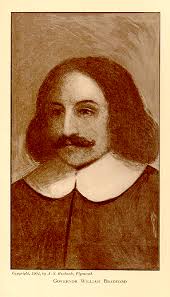 Born in 1590, William Bradford was a puritan and poet who formed part of the Pilgrim Fathers that landed at Plymouth in the Americas of 1620. Whilst he is widely known for his journal of the crossing on the Mayflower and the colony’s struggle to survive, Bradford was also a prolific poet in his later years.
Born in 1590, William Bradford was a puritan and poet who formed part of the Pilgrim Fathers that landed at Plymouth in the Americas of 1620. Whilst he is widely known for his journal of the crossing on the Mayflower and the colony’s struggle to survive, Bradford was also a prolific poet in his later years.
He was born in Yorkshire to a reasonably wealthy farming family, though he was an orphan by the time he was seven years old and was raised by two of his uncles. A little inward looking and not interested in farm work, Bradford diverted his attention to reading and may well have begun his intellectual and spiritual development here.
Another great influence were the sermons of puritan minister Richard Clyfton. Bradford used to attend his sermons and become interested in church reforms that would remain with him for the rest of his days. This was a dangerous time in England with King James I now on the throne and vowing to stop and imprison any reformers who were too vocal. Meetings of the Separatist group were often held in private and persecution was widespread, leading many to seek a new life in the Dutch Republic.
In 1608, Bradford finally made it to Amsterdam and, like many of his compatriots, worked at low paid jobs for a while. When he reached 21 he was able to claim his considerable family inheritance and lived in relative comfort. By 1613, he had married Dorothy May and six years later they moved back to London where negotiations were underway for the Separatist movement to colonize a part of Virginia in America.

The Mayflower departed in 1620 and Bradford began writing his journal, detailing the hardships of the journey and final settlement in Plymouth where nearly half the passengers died because of the harsh conditions in New England. When the first governor of the settlement, John Carver, died in 1621, Bradford was elected as his replacement.
Bradford’s most well-known work is Of Plymouth Plantation that was compiled between 1621 1646 in which he drew strong parallels between stories in the Bible and what was happening in everyday life in the colony. When he had finished writing it, Bradford turned more to poetry which served to remind the Separatists where they had come from. He was to despair of the ‘lost vision’ later in life as he saw them turn away from the truth of their original experiment of trying to build a new world and way of life.
The subject of the landing of the Pilgrim Fathers was put into a long poem called Some Observations which explored their first meetings with the local Indians through to the loss of the puritan ideals and the spiritual dissolution of the population, as Bradford saw it. His poetry was largely ignored for most of the following years because he wasn’t considered on a par with some of the literary greats of the time.

Bradford is often seen as the spiritual father of the Plymouth Colony and he remained governor until 1632 but was re-elected on several occasions over the ensuring years. He died in 1657 at the age of 67 and was laid to rest on Burial Hill in Plymouth.

